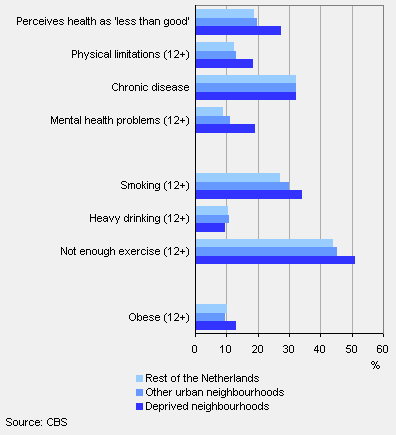People in deprived neighbourhoods slightly healthier

The health and lifestyle of people who live in deprived urban neighbourhoods in the Netherlands are not as good as those of people living outside these neighbourhoods. However, the mental health and perceived health of these residents have improved in recent years, and the number of smokers has dropped.
Health and lifestyle less favourable in deprived areas
People who live in the designated deprived neighbourhoods are more likely to perceive their health as less than good than people living in other urban neighbourhoods and in the rest of the Netherlands. People in deprived neighbourhoods also more often have physical limitations, and more of them have mental health problems. Their lifestyle is also less healthy: they smoke more and exercise less than people in the rest of the country. Also more of them are obese. Heavy drinking is not more common in these neighbourhoods, however.
Around half of the differences in health and lifestyle between deprived neighbourhoods and other urban neighbourhoods can be explained by differences in age, sex, education level and ethnic origin of the inhabitants. Relatively many people with a low education level live in deprived neighbourhoods, for example.
Health and lifestyle within and outside deprived neighbourhoods, 2005/2009

Perceived health and mental health improving
Since the designation of the deprived neighbourhoods in 2007, overall health in these neighbourhoods does seem to have improved somewhat. The percentage of people who perceived their health as less than good fell from 30 in 2005/2007 to 25 in 2007/2009. The proportion of people with mental health problems also decreased, from 21 to 17 percent. In other urban neighbourhoods and the rest of the Netherlands these percentages remained stable. Moreover, smoking has decreased in deprived neighbourhoods. Although this is also true for the rest of the Netherlands, the decrease there was smaller.
Perceived health, mental health and smoking

Jan-Willem Bruggink